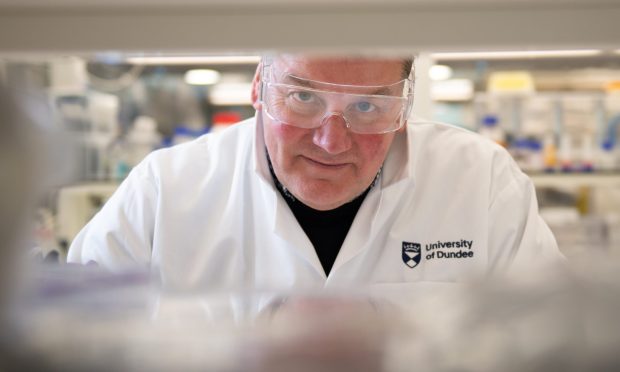Like a real world version of Popeye’s spinach, a simple pill could boost pensioners’ muscles – and even help them defy the ageing process.
Dundee University researchers are investigating whether a commonly available heart pill and food supplement could have other, previously unforeseen benefits.
They will launch a year-long clinical trial to examine whether they can prevent the weakening of muscles that commonly affects older people.
Joined by experts at Aberdeen University and Imperial College London, the research team aims to recruit 450 people aged 70 and over from across the UK.
Participants will be given a heart pill (perindopril) or a matching dummy tablet, and also a food supplement powder (leucine) or matching dummy powder.
The research team will then test how muscle strength, muscle size, daily function and quality of life change over the year.
Dr Miles Witham, lead researcher for the study at Dundee University, said previous research suggested that both perindopril and leucine might improve muscle strength.
As both treatments have been safely in older people’s medicine for many years, he is hopeful that could be at the heart of a health breakthrough.
“Muscle weakness, which we call sarcopenia, is really common as we get older, and I see many patients in my work as a geriatrician who are affected by this problem,” he said.
“Older people with weak muscles find it much harder to get around, or to climb stairs, and are more prone to falling and injuring themselves.
“In the long term people with weaker muscles are more likely to need help to look after themselves, so keeping muscles working well is important in keeping older people active and independent.
“Although we know exercise helps to improve muscle strength even in very old people, it’s important to find new ways to keep muscles working well in older people – and to help improve strength when muscles are weak.
“That’s why we are excited to be running this new trial.”
The £1.4 million trial, named LACE, is run by Tayside Clinical Trials Unit and is funded by the Efficacy and Mechanism Evaluation (EME) Programme – a partnership between the Medical Research Council and National Institute for Health Research.
The research team are collaborating with doctors at 15 centres across the UK, including those in Tayside and Fife.
Results from the trial are expected in 2019.
Anyone wishing more information on the study, including how they can volunteer to take part, should call 01382 383265 or visit www.lacetrial.org.uk.










